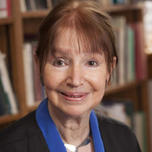Roberta Frank
Marie Borroff Professor of English and Professor of Linguistics
 Roberta Frank, B.A. New York University, Ph.D. Harvard University, faculty member at Yale since 2000: Your primary area of study has been Old English literature, together with Old Norse. From your book Old Norse Court Poetry: The Dróttkvætt Stanza to a new 2017 essay on Beowulf, with several more in press, your publications are legendary in the field for their brilliant lexicographical precision, subtlety of argument and critically illuminating linguistic scholarship.
Roberta Frank, B.A. New York University, Ph.D. Harvard University, faculty member at Yale since 2000: Your primary area of study has been Old English literature, together with Old Norse. From your book Old Norse Court Poetry: The Dróttkvætt Stanza to a new 2017 essay on Beowulf, with several more in press, your publications are legendary in the field for their brilliant lexicographical precision, subtlety of argument and critically illuminating linguistic scholarship.
For many years, you have steered the Dictionary of Old English at Toronto, ensuring the soundest foundation for the study of Old English for yours and future generations of linguists. You have led the profession in countless acts of service, as President of the Medieval Academy, and editor or editorial board member of numerous top journals and book series including Speculum, the University of Toronto Quarterly, Toronto Anglo-Saxon Studies, and Cambridge Studies in Medieval Literature and Culture. You were elected Fellow of the Royal Society of Canada, and have been awarded visiting fellowships across the world in Japan, Oxford, Spain, South Africa, and Australia.
In your fifty years of teaching at Harvard, Toronto, and Yale, you have advised or co-advised over thirty dissertations, sagely mentored students in your field and beyond, modeled generous academic citizenship, and inspired countless undergraduates with your keen critical mind, poetic sensibility, and sly wit. When awarded the Medieval Academy’s CARA Award for Excellence in Teaching, your letter of nomination resounded with references to your, “humor and wisdom,” “lightness and humanity,” and “playful approach to Old English and Old Norse literature.”
You might give students in your Viking lecture a paragraph in modern English and have them work out the words that did not descend from Norse. On their final exam, your Old English language students were likely to find themselves translating a Frankian cento, a new Anglo-Saxon poem in which Beowulf and Wealhtheow were rather friendlier than in the original. But while your approach was light, your goals were not. You use strategic levity to hone students’ critical acumen, teaching both graduates and undergraduates the importance of knowing the material, knowing the context, being precise and careful with analysis, and never forgetting the “so what?” question. In translation courses, you patiently walk your classes year by year through the intricacies of grammar and poetic language, excursing on Germanic cognates or mythological underpinnings. You are a master at making students feel as though what they have to say is original and important, then gently provoking further reflection and research so they can refine their ideas. Most of all, you encourage students to look ahead to how, when, and where their work might make an impact on a smaller or larger world.
Perhaps your greatest gift to your students, junior colleagues, and everyone is the way you model collegiality. You were President of The Elizabethan Club of Yale, where your gracious sense of community was shown in the way you helped keep the vault open, the tea up-to-par, and the social occasions inviting. You always are sending little messages: recommending a book, sharing news of a colleague’s triumph, relaying praise, sending witty words of comfort and support. Your small acts of kindness (so infrequently observed, because so skillfully and naturally done) offer a vision of how selfless and supportive scholarship can be. Your reach as a teacher, a mentor, an exemplar, and a colleague extends far outside and beyond your classroom. Your dedication to being inclusive, warm, and welcoming has fostered an academic community of medievalists, who strive to keep your wisdom, wit, and teaching legacy alive in their own craft. For all of this your devoted colleagues have only one word: Þancas.
Tribute Editor: Penelope Laurans